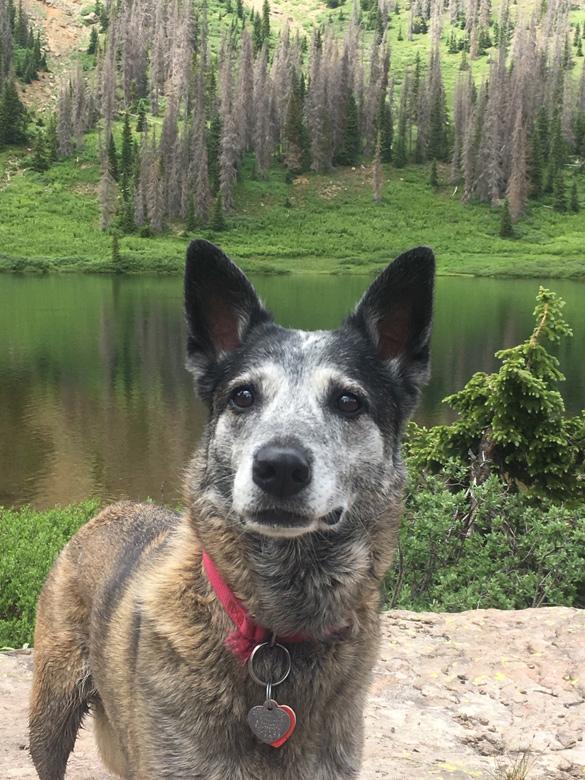 Proposed legislation on trapping named for Roxy, a dog killed by a trap set at Santa Cruz Lake. Courtesy photo
Proposed legislation on trapping named for Roxy, a dog killed by a trap set at Santa Cruz Lake. Courtesy photoSTATE News:
ESPAÑOLA — A dog was strangled to death Nov. 25 in a trap on public land. The incident happened at Santa Cruz Lake, a Bureau of Land Management recreation area in northern New Mexico.
The dog, Roxy, was the cherished companion of Dave Clark and his wife Kathrina of Española. Clark and Roxy were finishing their hike and returning to his vehicle when he heard Roxy, behind him, make a strange sound. When he turned to see why, he saw that she was struggling in a neck snare trap.
Clark was unable to loosen the snare before Roxy strangled to death in the trap.
Trapping is not allowed in this recreation area and the snare had no trapper identification as required by law. But there are millions of acres of public land where snares and other dangerous traps may be legally set. A trap is only required to be 25 yards away from a road maintained annually with public funds or from a trail marked on an agency map.
Trappers seek to profit from the fur of trapped wildlife such as bobcats, foxes, coyotes and badgers. Clark said that as he carried Roxy’s lifeless body back to his vehicle, he was startled by a bobcat, caught in a leg-hold trap, lashing out at him as he walked by. He said he was not hurt because the trap was chained to a juniper tree restraining the bobcat out of reach. When law enforcement from the New Mexico Department of Game and Fish found the location, the bobcat was still present and alive but was in such terrible condition that the officer euthanized the bobcat. The investigation of this case is still ongoing.
This story caught the attention of new State Land Commissioner Stephanie Garcia Richard, who focused on the issue of trapping during her campaign.
“New Mexico’s future depends on healthy lands and sustainable ecosystems,” Garcia Richard said. “Traps and snares on public land are dangerous, inhumane, environmentally destructive, and they have no place in a 21st Century economy. That’s why, as state land clommissioner, I’ve pledged to remove these outdated, dangerous devices from state trust lands.”
As land commissioner, Garcia Richard oversees 9 million acres of state trust land. But even after her office enacts the ban on state trust land, traps and snares will remain legal on more than three times as many public land acres in New Mexico, including those managed by the U.S. Forest Service and Bureau of Land Management, where the public enjoys outdoor recreation and which provide valuable wildlife habitat. For these lands, a legislative remedy is needed.
State legislation to prohibit traps, snares and poisons on public land—the New Mexico Wildlife Protection and Public Safety Act—is planned to be reintroduced during the upcoming 2019 state legislative session, sponsored by Rep. Bobby Gonzales (D-Taos) and Rep. Matthew McQueen (D-Santa Fe).
The 2018-2019 fur trapping season continues until March 15. NM Game and Fish, which sells the license to in-state trappers for $20, does not know the location or number of traps that are set, sccording to its spokesperson. There is no bag limit on furbearing species and no way to know how many unintended animals are also harmed. TrapFree New Mexico urges hikers to report any trapping incidents at their website, www.trapfreenm.org.
The TrapFree New Mexico coalition is calling the legislation “Roxy’s Law.”
“My heart just breaks hearing about this ordeal,” said volunteer Wildlife Chair Mary Katherine Ray of the Rio Grande Chapter of the Sierra Club, a coalition partner with TrapFree New Mexico. “These devices are simply not compatible with public access and I know I speak for all of us in the TrapFree NM coalition that we are more determined than ever that the archaic, brutal, cruel and exploitative practice of trapping end on our public lands.”
“New Mexico’s future economy and culture depends on the ability for New Mexicans and tourists to safely enjoy our public lands,” agreed Jessica Johnson, chief legislative officer for Animal Protection Voters, a coalition partner with TrapFree New Mexico. “Traps, snares and poisons on public lands are an unacceptable public safety risk and an affront to New Mexicans’ humane and conservation values.”

